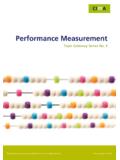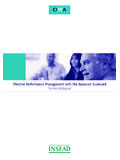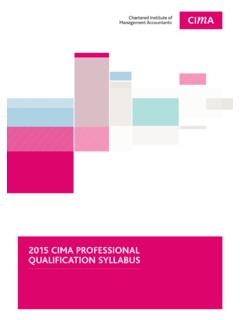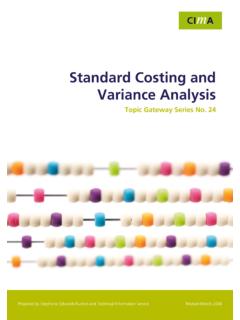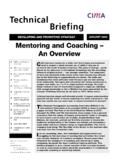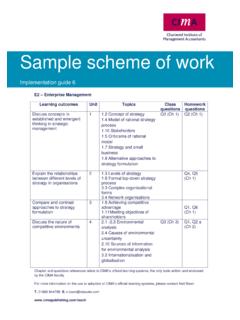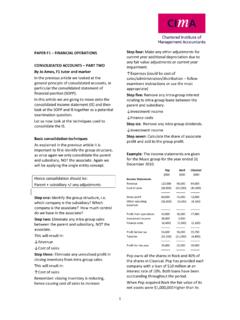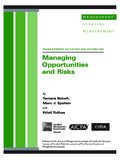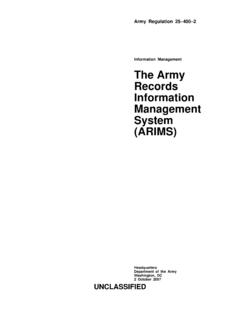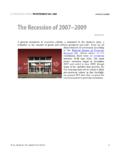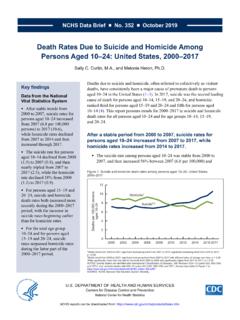Transcription of Beyond Budgeting Topic Gateway - CIMA
1 Topic Gateway Series Beyond Budgeting Beyond Budgeting Topic Gateway Series No. 35. 1. Prepared by Alexa Michael and Technical Information Service October 2007. Topic Gateway Series Beyond Budgeting About Topic Gateways Topic Gateways are intended as a refresher or introduction to topics of interest to CIMA members. They include a basic definition, a brief overview and a fuller explanation of practical application. Finally they signpost some further resources for detailed understanding and research. Topic Gateways are available electronically to CIMA members only in the CPD. Centre on the CIMA website, along with a number of electronic resources. About the Technical Information Service CIMA supports its members and students with its Technical Information Service (TIS) for their work and CPD needs. Our information specialists and accounting specialists work closely together to identify or create authoritative resources to help members resolve their work related information needs.
2 Additionally, our accounting specialists can help CIMA. members and students with the interpretation of guidance on financial reporting, financial management and performance management, as defined in the CIMA. Official Terminology 2005 edition. CIMA members and students should sign into My CIMA to access these services and resources. The Chartered Institute of Management Accountants 26 Chapter Street London SW1P 4NP. United Kingdom T. +44 (0)20 8849 2259. F. +44 (0)20 8849 2468. E. 2. Topic Gateway Series Beyond Budgeting Beyond Budgeting Definition and concept Beyond Budgeting is: An idea that companies need to move Beyond Budgeting because of the inherent flaws in Budgeting especially when used to set contracts. It is argued that a range of techniques, such as rolling forecasts and market related targets, can take the place of traditional Budgeting .'.
3 CIMA Official Terminology, 2005. A set of guiding principles that, if followed, will enable an organisation to manage its performance and decentralise its decision making process without the need for traditional budgets. Its purpose is to enable the organisation to meet the success factors of the information economy ( being adaptive in unpredictable conditions).'. Beyond Budgeting , p. 212. Beyond Budgeting (BB) is a specific idea which regards the abolition of the traditional budget process as the trigger for improving management control within organisations by a fundamental re-examination of how they might be managed better. The BBRT solution is radical and believes that the shortcomings of the Budgeting process can only be overcome by abandoning Budgeting altogether. The BBRT combines the new concept of Beyond Budgeting with the status of a community round table.
4 It shares its knowledge worldwide through conferences and workshops. The source of all BB ideas is the Beyond Budgeting Round Table (BBRT) an independent industry led research consortium. The BBRT was established in the UK in 1998, but now has members in mainland Europe, the US and Australia. Much of the following information is derived from the BBRT website and from Hope and Fraser (2003) Beyond Budgeting : how managers can break free from the annual performance trap. 3. Topic Gateway Series Beyond Budgeting BB identifies its two main advantages. It is a more adaptive process than traditional Budgeting . It is a decentralised process, unlike traditional Budgeting where leaders plan and control organisations centrally. When BBRT use the term budget, they mean the entire performance management process. Background It could be argued that budgets began in the 1920s as tools for managing costs and cash flows.
5 By the 1960s, they had become fixed performance contracts between company superiors and subordinates. They were primarily concerned with estimating future income and expenditure. It could be argued that budgets became the key drivers and evaluators of managerial performance. The oil price shocks and subsequent inflationary pressures of the mid 1970s changed organisational competitiveness. From the 1980s onwards, there has also been a climate of volatile stock markets. More recently, there have been several other impacts on business. Shareholders now demand that their organisations are at or near the top of their industry peer group. Intangible assets, including brand names and customer loyalty, are now key drivers of shareholder value. There are shorter product and strategy cycles, with prices and margins under increasing pressure. There is a focus on reducing costs and on customer satisfaction.
6 The BBRT argument is that traditional budgetary or control practices are not sufficient to cope with these changing market trends. Various commentators have identified the drawbacks of traditional budgets that they: rarely focus on strategy and are often contradictory are time consuming and costly to put together constrain responsiveness and flexibility often deter change add little value, especially given the time taken to prepare them focus on cost reduction rather than value creation strengthen vertical command and control. 4. Topic Gateway Series Beyond Budgeting The BBRT proposes an alternative management model which they feel supports the needs of modern business. They feel that a new set of coherent management processes and a new leadership style are essential to achieving the full potential of an organisation and its people. Overview BB uses a range of tools and techniques as a replacement for the traditional Budgeting process.
7 For example, BB might combine the Balanced Scorecard with rolling forecasts and shareholder value models. BB offers an implicit performance contract to managers, with reward based on relative performance achieved. The targets which replace budgets must be aligned with incentives to support a new culture of accountability within the organisation. Abandoning the traditional Budgeting process has two goals: 1. A more adaptive set of management processes 2. A highly decentralised organisation A more adaptive set of management processes can be achieved without decentralisation, but the reverse is not possible. The BBRT includes a diverse range of companies in Europe and the US. They include banks, chemical and petrochemical companies, a wholesaler, a brewer, car and truck manufacturers, a food producer, an eye care company, a computer company and ball bearing manufacturer.
8 The case studies used by the BBRT to demonstrate their approach include the Swedish bank Svenska Handelsbanken, which ceased Budgeting in 1972. It allows managers discretion to act within prescribed boundaries. It uses branch league tables to promote competition among staff. Another case is the Swedish wholesaler Ahlsell which has over 200 decentralised profit centres. Further cases can be found in the BBRT book. 5. Topic Gateway Series Beyond Budgeting Application In their book, Beyond Budgeting , Hope and Fraser describe the six shared common principles used by all the companies which have chosen BB as an alternative to traditional Budgeting . 1. A governance framework based on clear priorities and boundaries This enables front line teams to take decisions. A coach and support style of management promotes community spirit and a seamless service for customers.
9 2. A high performance climate based on visible and relative success at all levels This promotes peer based performance reviews, internal competition and a sense of customer ownership. 3. Front line teams with the freedom to take decisions in line with the company's governance principles and strategic goals This advocates the abandonment of a safety first approach to open up the strategy process to all contributors. High standards, higher expectations and benchmarks are promoted. 4. Teams given responsibility for value creating systems This creates and empowers many small units within the company, who have the freedom to manage their own resources while remaining accountable. 5. Teams focused on customer outcomes This leads to greater accountability, as well as more satisfied and profitable customers. 6. Open and ethical information systems This generates more reliable information, greater transparency and more ethical reporting.
10 6. Topic Gateway Series Beyond Budgeting Hope and Fraser then describe how these companies did the following differently as part of the BB process. Setting targets Previously, targets were set on the basis of financial numbers and negotiated centrally. Under BB, targets are based on high level key performance indicators (Kips). These include return on capital, free cash flows or cost to income ratios. Goals are set to maximise short and medium term profit potential. Reported benefits: The BBRT argues that this is much faster than Budgeting . The benchmarking bar is constantly raised to encourage maximum profit potential. Rewarding people In traditional Budgeting , rewards were linked to a fixed outcome agreed in advance. BB rewards team success based on relative performance, not fixed annual targets. Reported benefits: The best performers are recognised and rewarded, not just the skilled budget negotiators.
